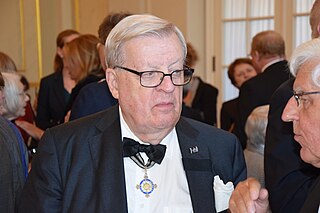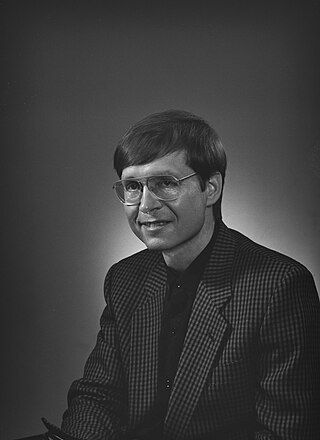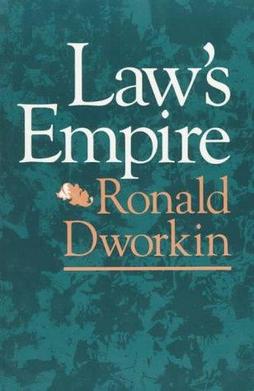Related Research Articles

Jurisprudence, also known as theory of law or philosophy of law, is the examination in a general perspective of what law is and what it ought to be. It investigates issues such as the definition of law; legal validity; legal norms and values; as well as the relationship between law and other fields of study, including economics, ethics, history, sociology, and political philosophy.

Kaarlo Juho Ståhlberg was a Finnish jurist and academic who was one of the most important pioneers of republicanism in the country. He was the first president of Finland (1919–1925) and a liberal nationalist.
In jurisprudence and legal philosophy, legal positivism is the theory that the existence of the law and its content depend on social facts, such as acts of legislation, judicial decisions, and customs, rather than on morality. This contrasts with natural law theory, which holds that law is necessarily connected to morality in such a way that any law that contradicts morality lacks legal validity.

Ronald Myles Dworkin was an American legal philosopher, jurist, and scholar of United States constitutional law. At the time of his death, he was Frank Henry Sommer Professor of Law and Philosophy at New York University and Professor of Jurisprudence at University College London. Dworkin had taught previously at Yale Law School and the University of Oxford, where he was the Professor of Jurisprudence, successor to philosopher H. L. A. Hart.

Herbert Lionel Adolphus Hart was an English legal philosopher. One of the most influential legal theorists of the 20th century, he was instrumental in the development of the theory of legal positivism, which was popularised by his book, The Concept of Law. Hart's contributions focused on the nature of law, the relationship between law and morality, and the analysis of legal rules and systems, introducing concepts such as the "rule of recognition" that have shaped modern legal thought.

John Austin was an English legal theorist who posthumously influenced British and American law with an analytical approach to jurisprudence and a theory of legal positivism. Austin opposed traditional approaches of "natural law", arguing against any need for connections between law and morality. Human legal systems, he claimed, can and should be studied in an empirical, value-free way.

Stig Fredrik Strömholm, Swedish, former rector magnificus of Uppsala University and past president of Academia Europaea.

Robert Alexy is a jurist and a legal philosopher.
Pure Theory of Law is a book by jurist and legal theorist Hans Kelsen, first published in German in 1934 as Reine Rechtslehre, and in 1960 in a much revised and expanded edition. The latter was translated into English in 1967 as Pure Theory of Law. The title is the name of his general theory of law, Reine Rechtslehre.

Kaarlo Jaakko Juhani Hintikka was a Finnish philosopher and logician. Hintikka is regarded as the founder of formal epistemic logic and of game semantics for logic.

Joseph Raz was an Israeli legal, moral and political philosopher. He was an advocate of legal positivism and is known for his conception of perfectionist liberalism. Raz spent most of his career as a professor of philosophy of law at Balliol College, Oxford, and was latterly a part-time professor of law at Columbia University Law School and a part-time professor at King's College London. He received the Tang Prize in Rule of Law in 2018.

Simo Kaarlo Antero Parpola is a Finnish Assyriologist specializing in the Neo-Assyrian Empire and Professor emeritus of Assyriology at the University of Helsinki.
Matthew Henry Kramer is an American philosopher, and is currently a Professor of Legal and Political Philosophy at the University of Cambridge and a Fellow of Churchill College, Cambridge. He writes mainly in the areas of metaethics, normative ethics, legal philosophy, and political philosophy. He is a leading proponent of legal positivism. He has been Director of the Cambridge Forum for Legal and Political Philosophy since 2000. He has been teaching at Cambridge University and at Churchill College since 1994.
Jules Leslie Coleman is a scholar of law and jurisprudence. He was the Wesley Newcomb Hohfeld Professor of Jurisprudence and Professor of Philosophy at Yale Law School until 2012. Coleman is chief academic officer at MYX, a hybrid approach to higher education with campuses starting fall 2021. Before joining MYX, he was the Senior Vice Provost for Academic Planning at New York University.
Jurisprudence of values or jurisprudence of principles is a school of legal philosophy. This school represents, according to some authors, a step in overcoming the contradictions of legal positivism and, for this reason, it has been considered by some authors as a post-positivism school. Jurisprudence of values is referred to in various works all over the world.

Olli Erkki Lehto was a Finnish mathematician, specializing in geometric function theory, and a chancellor of the University of Helsinki.

Scott Jonathan Shapiro is the Charles F. Southmayd Professor of Law and Philosophy at Yale Law School and the Director of Yale's Center for Law and Philosophy and of the Yale CyberSecurity Lab.

Law's Empire is a 1986 text in legal philosophy by Ronald Dworkin, in which the author continues his criticism of the philosophy of legal positivism as promoted by H.L.A. Hart during the middle to late 20th century. The book introduces Dworkin's Judge Hercules as an idealized version of a jurist with extraordinary legal skills who is able to challenge various predominating schools of legal interpretation and legal hermeneutics prominent throughout the 20th century. Judge Hercules is eventually challenged by Judge Hermes, another idealized version of a jurist who is affected by an affinity to respecting historical legal meaning arguments which do not affect Judge Hercules in the same manner. Judge Hermes' theory of legal interpretation is found by Dworkin in the end to be inferior to the approach of Judge Hercules.
Edward Andersson was a Finnish legal scholar.
Johan Otto Wilhelm Wrede is a Finnish literary historian.
References
- ↑ "Tuori, Kaarlo". Uppslagsverket Finland (in Swedish). Retrieved 30 December 2021.
- ↑ "Utenlandske medlemmer" (in Norwegian). Norwegian Academy of Science and Letters . Retrieved 31 December 2021.